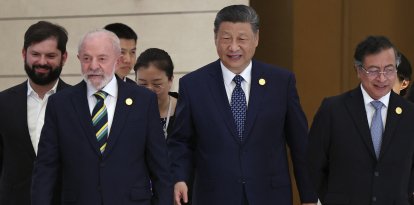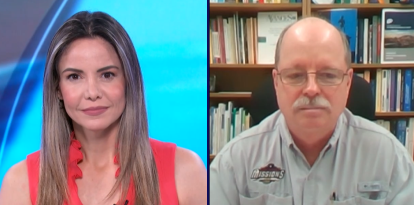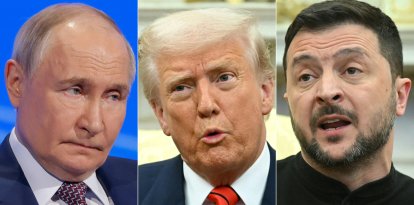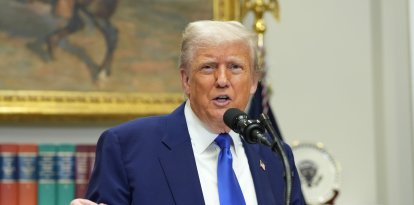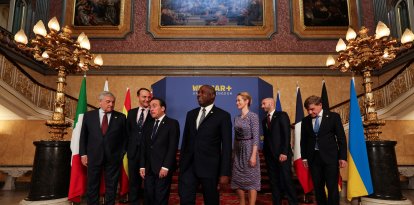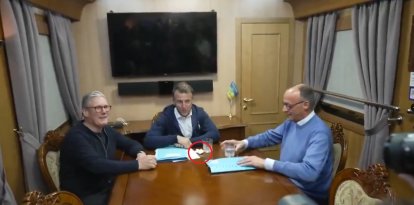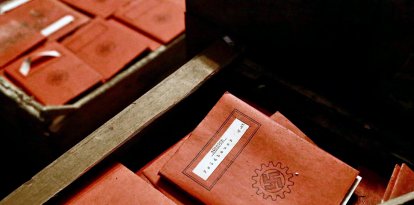Maduro's tyrannical regime steals Venezuelan elections
Venezuelans came out to the polls en masse, and estimates showed Edmundo González as the clear winner. However, the regime committed fraud, according to the opposition.
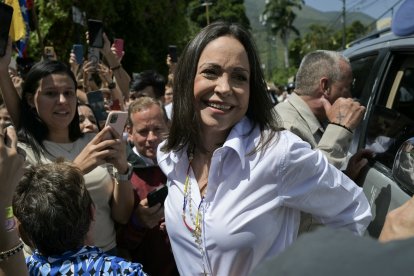
María Corina Machado, leader of the Venezuelan opposition, on July 28.
Nicolás Maduro's socialist regime, after a marathon election day in Venezuela, committed a notorious case electoral fraud that is being widely denounced and condemned by the international community.
Despite all projections to the contrary, the Venezuelan Electoral Council (CNE) announced Maduro as the winner of the presidential election with 51.2% of the vote. Meanwhile, 44.2% of the vote went to opposition candidate Edmundo González Urrutia, supported by opposition leader María Corina Machado.
According to Elvis Amoroso, president of the CNE, an entity controlled by the Chavista regime, the results were announced with 80% of the votes counted. These results were said to show an "irreversible" trend. This report indicated a 59% turnout. Just before Amoroso's statement, the opposition claimed there were systematic irregularities in polling stations across the country.
Maria Corina Machado assures that the opposition obtained "70% of the votes"
After learning the results presented by the regime, opposition leader Maria Corina Machado and candidate Edmundo Gonzalez stressed that "the country chose a change in peace" in a joint press conference.
"We won and everybody knows it. We want to tell all of Venezuela and the world that Venezuela has a new president elect and he is Edmundo González Urrutia. González Urrutia obtained 70% of the votes and Nicolás Maduro 30%. This is the truth. Congratulations, Edmundo," Machado said.
Following the announcement, the international community began to react.
The most significant reaction so far came from U.S. Secretary of State Antony Blinken, who demanded votes be recounted "fairly and transparently" in Venezuela's presidential election.
Before the U.S., some South American countries had already spoken out against the electoral fraud.
Chilean President Gabriel Boric, a progressive, stated, "The Maduro regime must understand that the results it released are hard to believe. The international community and especially the Venezuelan people, including the millions of Venezuelans in exile, demand total transparency of the records and the process, and that international observers not compromised by the government verify the results. From Chile, we will not recognize any result that cannot be verified."
Javier González-Olaechea, Peru's foreign minister, also made a statement: "I condemn in all its extremes the accumulation of irregularities with the intent of fraud by the Venezuelan government. Peru will not accept the violation of the popular will of the Venezuelan people."
The situation in Venezuela is very tense. Independent journalists report that Caracas, the Venezuelan capital, is militarized and that there is violence in the interior of the country.
Meanwhile, María Corina Machado and Edmundo González are moments away from giving their first statements following the fraud.
How the elections proceeded before the fraud
This is a crucial moment for Venezuela. As early as Saturday night and early Sunday morning, citizens from all regions of the country arrived to the polling stations to spend the night on watch, waiting for the centers to open and cast their vote for one of the main candidates: the opposition nominee Edmundo González, backed by leader María Corina Machado, and the dictator Nicolás Maduro.
The unprecedented event was a preamble to a historic election day, with more than 11 million Venezuelans going to the polls despite the threats, outrage and electoral crimes committed by the Maduro regime throughout the campaign and during election day itself. In fact, in recent hours, a serious act of violence was reported, with a Venezuelan citizen killed when a paramilitary group burst into a polling station in the state of Táchira after the polls were closed.
#ULTIMAHORA | Un asesinado en el marco de las elecciones venezolanas cuando el grupo de paramilitares chavistas irrumpió con disparos en un centro electoral en el estado Táchira pic.twitter.com/gb811v8Zg7
— VOZ (@VozMediaUSA) July 29, 2024
The situation was very tense.
María Corina Machado, leader of the Venezuelan opposition, held a press conference just after 7 p.m., one hour after the polls closed, where she stated that they had received early numbers and implied that they are encouraging, but that they cannot make them public yet due to the electoral rules. In that sense, Machado reaffirmed her message to Venezuelans and electoral monitors: the votes must be protected.
"We need everyone to be at their voting centers accompanying the witnesses," Machado said, before sending a message to the electoral witnesses: "Do not leave the table centers without your voting records."
Nos quedamos en los centros!!
— María Corina Machado (@MariaCorinaYA) July 28, 2024
Testigos, electores y todo el mundo a presenciar el conteo papelito por papelito, hasta tener acta en mano! pic.twitter.com/gdYVUrUtxO
The voting records are the evidence of the count that took place at the polling stations, a crucial role that the opposition will need to validate a potential victory that, according to independent estimates, should have been certain.
In fact, The Wall Street Journal picked up one of the exit polls from the prestigious global firm Edison Research, which outlined a resounding triumph for the Venezuelan opposition: 65% for Edmundo González; 31% for Nicolás Maduro.
#Venezuela: The Wall Street Journal reports the exit polls of the prestigious global firm Edison Research, which shows a resounding victory for the Venezuelan opposition: 65%, Edmundo Gonzalez; 31%, Nicolas Maduro pic.twitter.com/5VmwSwFC1x
— VOZ (@Voz_US) July 28, 2024
However, at this time, the sirens about a potential fraud have begun to sound.
Two hierarchs of the Chavista dictatorship, Deputies Diosdado Cabello and Jorge Rodriguez, gave joint statements implying that the ruling party took the elections and that they will celebrate when the CNE issues the results in its first bulletin.
"Once the bulletin is issued, we will meet," said Rodríguez, who in addition to Cabello, was accompanied by his sister, Delcy Rodríguez, Venezuela's vice-president.
Likewise, Venezuelan Minister of Defense Vladimir Padrino López, a member of the Chavista leadership circle, publicly suggested that the numbers prove victory for the ruling party: "Today we saw how people rejected the sanctions."
🚨 El ministro chavista de la Defensa Vladimir Padrino López:
— Emmanuel Rincón (@EmmaRincon) July 29, 2024
“El pueblo venezolano se levantó para rechazar las sanciones”.
Van a perpetrar el fraude ante los ojos del mundo, todos atentos, todos en los centros electorales:
pic.twitter.com/N8D6oGMDTk
However, the words of Rodriguez, Cabello and Padrino López not only contrast with the independent exit polls, but also with the majority of the results from the polling stations in all regions of Venezuela at this very moment, where the difference between Edmundo González and Nicolás Maduro is widely favorable to the opposition candidate.
For example, in the electoral center La Concepción in Baruta in the state of Miranda, the difference in favor of González was immense: 2,459 votes for him, compared to 209 votes for Maduro.
In the polling place in Punto Fijo in the state of Falcón, Nicolás Maduro obtained 648 votes and Edmundo González 2,226, according to the public reading.
In the polling station in El Hatillo, Caracas: Nicolás Maduro reached just 43 votes, while Edmundo González had 424.
Throughout Venezuela, preliminary reports mark this trend, in a day where the Venezuelan diaspora, comprised of some 8 million people, could not participate in the election due to obstacles put in place by the electoral authorities controlled by Maduro's dictatorship.
Although the official Venezuelan electoral roll stands at some 21 million voters, the reality is that only an estimated 14 to 16 million were eligible to vote. Of that number, according to the opposition's anticipated national turnout, at least 11.7 million turned out to vote, although that update does not reflect the final hours of voting.
🗳️ Cuarto boletín oficial #ConVzla:
— Comando ConVzla (@ConVzlaComando) July 28, 2024
Compartimos información de las 4:00pm: participación nacional de 54,8%, para un total aproximado de 11,7 millones de venezolanos.
¡Todos al centro de votación! #VotaYReportaConVzla pic.twitter.com/nhw4nQG6oc
Now, although Venezuelan exiles were not able to exercise their right to vote, they did participate in the process. In all major cities around the world, Venezuelans mobilized and demonstrated to cry for freedom. Madrid, Miami, New York, Washington, Texas, Bogotá, Medellín, Buenos Aires, Asunción, Santiago de Chile and cities all over the planet took out their flags, sang their anthem and accompanied the historic process from a distance.
The international community is closely observing the events in Venezuela
Senator Marco Rubio (R-Fla.), of Cuban-American origin, has been following the electoral process and alerted the international community of a potential fraud: "Everybody knows massive voter turnout like the one today in Venezuela would result in a massive loss by Maduro. The ONLY way he wins is with massive fraud."
Todo el mundo sabe que la participación masiva de los votantes como la que se ve hoy en #Venezuela resultaría en una gran derrota por parte de Maduro. La ÚNICA forma en que gana es si intentan llevar a cabo un fraude masivo.
— Marco Rubio (@marcorubio) July 29, 2024
Everybody knows massive voter turnout like the one…
Vice President Kamala Harris, who is days away from becoming the official Democratic candidate for president, also sent a message while awaiting the official results.
"The United States stands with the people of Venezuela who expressed their voice in today's historic presidential election," Harris said on X (formerly Twitter). "The will of the Venezuelan people must be respected. Despite the many challenges, we will continue to work toward a more democratic, prosperous and secure future for the people of Venezuela."
In turn, seven Latin American countries: Argentina, Costa Rica, Ecuador, Panama, Paraguay, Peru and Uruguay, warned in a joint communiqué that they are closely following developments in Venezuela.
"The foreign ministers of Argentina, Costa Rica, Ecuador, Panama, Paraguay, Peru and Uruguay are closely following the events in Venezuela, and we consider it essential to have guarantees that the electoral results will fully respect the popular will expressed by the Venezuelan people at the polls. This can only be achieved through a transparent vote count, which allows for the verification and control of observers and delegates of all candidates."
RECOMMENDATION
